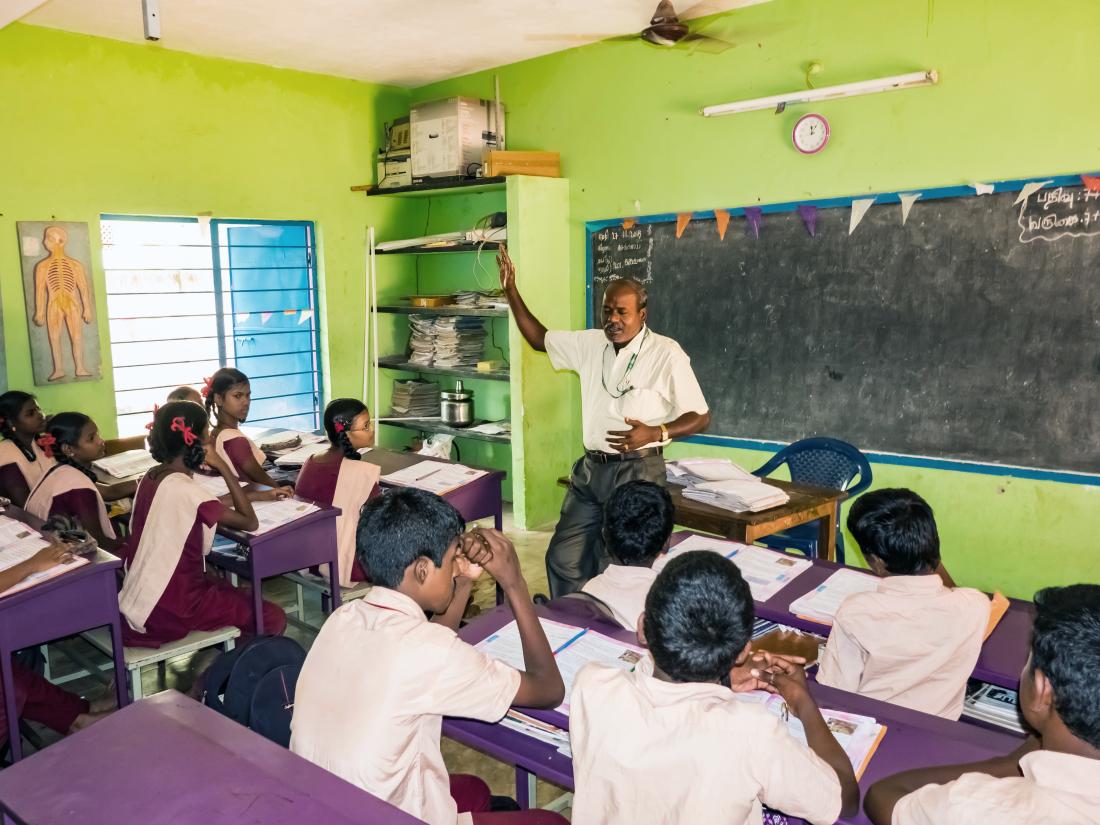Impact of School Leadership Training on Management Practices and Student Learning in India
- Secondary schools
- School administrators
- Student learning
- Service provider performance
- Take-up of program/social service/healthy behavior
- Coaching and mentoring
- Training
Schools with strong management practices often have better student learning outcomes than schools with poor management practices, a trend that typically holds during major school disruptions such as the Covid-19 pandemic. However, there is little evidence on how strengthening school management practices affects student achievement, especially in low- and middle-income countries. In this randomized evaluation, researchers will test the impact of a large-scale leadership training program in India on improving school management practices and student learning.
Policy issue
Schools with strong management practices often have better student learning outcomes than schools with poor management practices, a trend that typically holds during major school disruptions such as the Covid-19 pandemic. In 2019, a review of 65 countries found that compared to schools with the least efficient management practices, schools with the most efficient practices have improved student learning equivalent to three months of schooling annually. However, there is little evidence on how strengthening school management practices affects student achievement, especially in low- and middle-income countries. As management training may not necessarily lead to an increase in good management practices, it is unclear whether it can improve student outcomes. At the same time, evidence shows that personalized coaching may have a positive effect on teacher effectiveness.
Can offering principals a school leadership development training improve school management practices and subsequent student Foundational Literacy and Numeracy (FLN) learning outcomes, and do these outcomes differ among girls or those with lower initial learning levels? Does providing personalized school leadership coaching in addition to group training further impact management practices and student outcomes?
Context of the evaluation
In India, there is often low support and training for school leadership. In the 2016-2017 school year, fourteen states and territories did not have any school leadership training for principals, with insufficient management of teachers, school operations, and school monitoring. Additionally, as school principals spend most of their time on administrative tasks, they have very little time to support teachers.
In Telangana, India’s twelfth most populous state, the Telangana Social and Tribal Welfare Residential Educational Institutions Societies (TSWREIS and TTWREIS) are comprised of over 400 public, residential schools for some of the most disadvantaged students in Telangana: over half are from the poorest third of households, and less than thirty percent speak the school language of instruction at home. In TSWREIS/TTWREIS schools, school principals have at least 8 years of teaching experience and are trained in school administration and finance, with limited focus on how to create a vision to address school needs. During Covid-related school closures in India, school leaders did not receive any systematic training to reopen schools and reintegrate students back into school.
Global School Leaders (GSL) is an international school leadership NGO, with a local NGO partner in India called Alokit. The three-year GSL-Alokit Leadership Program trains principals in five types of leadership: strategic, instructional, community, operational, and human resources leadership. In particular, principals who undergo the training program participate in seven knowledge and skills-based workshops (38 hours, four online, three in-person) annually, after which they eventually develop a “school improvement and development plan.” Principals also receive individualized support to implement lessons learned during the program in their own schools. Along with improving learning equity, the leadership training also focuses on reducing corporal punishment, which is especially widespread in Telangana and also linked to gender-based violence.

Details of the intervention
Researchers are partnering with Global School Leaders and Alokit to conduct a three-year randomized evaluation to test the impact of GSL-Alokit’s leadership training on school management practices and student learning outcomes. The study will cover 380 residential TSWREIS and TTWREIS schools. During the study, all schools will be randomly assigned to one of the following three groups:
- Training group: Principals of schools in this group will be invited to undergo GSL-Alokit’s three-year leadership training program as described above.
- Training and coaching group: Principals of schools in this group will go through both GSL-Alokit’s leadership training program, as well as receive seven individualized coaching touch-points (three online, two in-person visits) every year, to help implement what they learn in their own schools (16 hours).
- Comparison group: Principals of schools in this group will neither go through the leadership training program nor receive individualized coaching visits.
Researchers’ main outcome of interest from the training program will be student learning outcomes, collected from administrative data including state board exams for grades 10–12, and survey assessments in foundational language and math skills for grades 6–8. Researchers will also gather data on schools’ operations management, people management, teaching quality, and use of corporal punishment and violence in schools. Data collection through student learning assessments, student and principal surveys, and unannounced school visits will occur in three rounds from 2022 to 2025, at the start, middle, and end of the study.
Results and policy lessons
Research ongoing; results forthcoming.